De Brits-Amerikaanse schrijver Christopher Isherwood werd geboren op 26 augustus 1904 in Disley in het graafschap Cheshire in Engeland. Zie ook mijn blog van 26 augustus 2010 en eveneens alle tags voor Christopher Isherwood op dit blog.
Uit: Mr Norris Changes Trains
“Mr Norris had two front doors to his flat. They stood side by side. Both had little round peep-holes in the centre panel and brightly polished knobs and brass nameplates. On the left-hand plate was engraved: Arthur Norris . Private. And on the right hand: Arthur Norris . Export and Import . […] I noticed immediately I was inside, [that] the Private side of the entrance hall was divided from the Export side only by a thick hanging curtain. “
(…)
“’Do you know what time we arrive at the frontier?’Looking back on the conversation, this question does not seem to me to have been particularly unusual. It is true that I had no interest in the answer; I wanted merely to ask something which might start us chatting, and which wasn’t, at the same time, inquisitive or impertinent. Its effect on the stranger was remarkable. I had certainly succeeded in arousing his interest. He gave me a long, odd glance, his features seemed to stiffen a little. It was the glance of a poker-player who guesses suddenly that his opponent hold a straight flush and that he had better be careful. At length he answered, speaking slowly and with caution:‘I’m afraid I couldn’t tell you exactly. In about an hour’s time, I believe. ‘His glance, now vacant for a moment, was clouded again. An unpleasant thought seemed to tease him like a wasp; he moved his head slightly to avoid it.”
(…)
“I must say that I have always felt that, in the deepest sense, we are all brothers. Class distinctions have never meant anything to me; and hatred of tyranny is in my blood. Even as a small child I could never bear injustice of any kind. It offends my sense of the beautiful. It is so stupid and unaesthetic. I remember my feelings when I was first unjustly punished by my nurse. It wasn’t the punishment itself which I resented; it was the clumsiness, the lack of imagination behind it. That, I remember, pained me very deeply.”
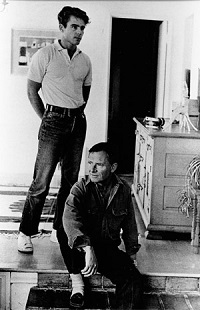
Christopher Isherwood (26 augustus 1904 – 4 januari 1986)
Hier met partner Don Bachardy (l) in 1962
De Duitse schrijver Joachim Helfer werd geboren in Bonn op 26 augustus 1964. Zie ook mijn blog van 26 augustus 2010 en eveneens alle tags voor Joachim Helfer op dit blog.
Uit: Die Verschwulung der Welt (Samen met Raschid ad-Daʿif)
“Rashid al-Daif ist ein arabischer Christ. Ich glaube, das ist einer der wichtigsten Aspekte dieses Buches, dass ein arabischer Christ Dinge schreibt, die bei uns in Europa manchmal so klingen, als würde ein gemäßigter Islamist sprechen, kein Fanatiker, aber doch jemand der bestimmte Vorstellungen des politischen Islam jedenfalls nicht völlig ablehnt, obwohl er das politisch absolut tut. Er ist weit entfernt in irgendeiner Weise Islamist zu sein.”
(…)
“Was Raschid gar nicht auffällt ist, wie stark manche Bereiche der Öffentlichkeit von Männern beherrscht werden, also beispielsweise, in seinem Stammcafé, das Café de Paris, das ist das ehrwürdige Intellektuellencafé des Landes, sind eben nur Männer und auf unseren Veranstaltungen in einigen Universitäten des Landes und an anderen Orten hat eben nur ein einziges Mal eine Frau das Wort ergriffen und ansonsten 60 oder 70 Männer, und diese eine Frau hat dann auch eine ganz spezifische Frage zur Ermutigung von arabisch weiblichen Emanzipationsbestrebungen durch den Westen gestellt.”
(…)
“Ich habe nicht aus ideologischen, politischen oder anderen Gründen ein Kind in die Welt gesetzt, sondern weil ich das tiefe innere Bedürfnis hatte Vater zu werden und weil ich – mein Text kann ja auch gelesen werden als eine kritische Bestandsaufnahme des bisherigen Emanzipationsweges der Homosexuellen -, und weil ich den erreichten Zustand, dass wir eine anerkannte ethnische Minderheit der Schwulen und Lesben haben, die ihr anerkanntes und unangetastetes gesellschaftliches Getto bewohnen darf für oder gegen dass man sich um es mal etwas überspitzt zu formulieren, dass man sich mit 18 entscheiden muss, also diese weitere Segmentierung der Gesellschaft auch nicht für das Erstrebenswerteste halte. Dieses homosexuelle Getto ist als Schutzraum eine wichtige Zwischenetappe. Eine emanzipierte Gesellschaft würde aber ohne ein solches Getto auskommen und würde sich über die Frage. ob jemand eine Frau oder ein Mann im Augenblick liebt, ob jemand ein Kind hat oder kein Kind hat oder mehrere Kinder hat, nicht in solchen Kategorisierungen den Kopf zerbrechen.”
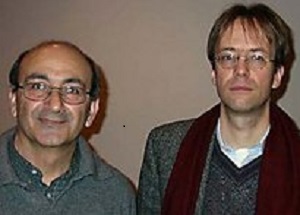
Joachim Helfer (Bonn, 26 augustus 1964)
Hier met Raschid ad-Daʿif (links)
De Franstalige schrijver en dichter Guillaume Apollinaire werd in Parijs geboren op 26 augustus 1880. Zie ook mijn blog van 26 augustus 2010 en eveneens alle tags voor Guillaume Apollinaire op dit blog.
Si je mourais là-bas…
Si je mourais là-bas sur le front de l’armée
Tu pleurerais un jour ô Lou ma bien-aimée
Et puis mon souvenir s’éteindrait comme meurt
Un obus éclatant sur le front de l’armée
Un bel obus semblable aux mimosas en fleur
Et puis ce souvenir éclaté dans l’espace
Couvrirait de mon sang le monde tout entier
La mer les monts les vals et l’étoile qui passe
Les soleils merveilleux mûrissant dans l’espace
Comme font les fruits d’or autour de Baratier
Souvenir oublié vivant dans toutes choses
Je rougirais le bout de tes jolis seins roses
Je rougirais ta bouche et tes cheveux sanglants
Tu ne vieillirais point toutes ces belles choses
Rajeuniraient toujours pour leurs destins galants
Le fatal giclement de mon sang sur le monde
Donnerait au soleil plus de vive clarté
Aux fleurs plus de couleur plus de vitesse à l’onde
Un amour inouï descendrait sur le monde
L’amant serait plus fort dans ton corps écarté
Lou si je meurs là-bas souvenir qu’on oublie
– Souviens-t’en quelquefois aux instants de folie
De jeunesse et d’amour et d’éclatante ardeur –
Mon sang c’est la fontaine ardente du bonheur
Et sois la plus heureuse étant la plus jolie
Ô mon unique amour et ma grande folie
30 janv. 1915, Nîmes.
Refus de la colombe
Mensonge de l’Annonciade
La Noël fut la Passion
Et qu’elle était charmante et sade
Cette renonciation
Si la colombe poignardée
Saigne encore de ses refus
J’en plume les ailes l’idée
Et le poème que tu fus
La tranchée
Ô jeunes gens je m’offre à vous comme une épouse
Mon amour est puissant j’aime jusqu’à la mort
Tapie au fond du sol je vous guette jalouse
Et mon corps n’est en tout qu’un long baiser qui mord
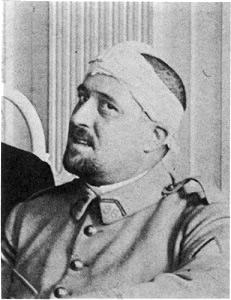
Guillaume Apollinaire (26 augustus 1880 – 9 november 1918)
Apolinaire raakte tijdens WO I gewond door grantaatscherven
De Franse schrijver Jules Romains, pseudoniem van Louis Henri Farigoule, werd geboren op 26 augustus 1885 in La Chapuze in het kanton Saint-Julien-Chapteuil. Zie ook mijn blog van 26 augustus 2010 en eveneens alle tags voor Jules Romain op dit blog.
Uit: Prélude à Verdun
«Puisqu’il n’était plus question d’hésiter ni de choisir, l’on remerciait presque le sort de vous avoir forcé la main. Peut-être allait-on bientôt s’apercevoir qu’avec ces rudes façons il vous avait rendu service, comme le maître-nageur au débutant qu’il pousse à l’eau. 348 »’ ‘_ « (…)chez les uns comme chez les autres, il y avait encore l’excitation de partir pour des vacances bruyantes, brutales, tumultueuses ; de vraies vacances de garçons. (C’était d’ailleurs la bonne époque de l’année. )On allait se reposer de la paix. La paix comporte des milliers de soucis(…)On allait s’offrir une période d’insouciance et de sans-gêne, une orgie de mouvements brusques, sans aucun égard pour les choses fragiles ; une cure de grossièreté primitive, de tout à fait mauvaises manières, d’impolitesse radicale. Cette débauche vous souriait d’avance d’autant plus qu’on était plus jeune, qu’on se portait mieux ; et qu’on savait qu’elle serait courte. »
(…)
« La peine est sans précédent, les sacrifices, démesurés. Mais le but, lui aussi, est le plus sublime qui se soit jamais offert à des hommes. La fin de la guerre dans le monde ? Depuis que le monde existe, il n’y aura pas eu de date plus importante. Autant dire que la vraie civilisation commence.
Mais cette brave pensée était suivie d’une autre, comme de son ombre : ‘‘Il faut en tout cas que ça finisse cette année.’’
(…)
« On sait, hélas ! ce qu’on peut faire et ce qu’on peut endurer. On sait que le courage est sans aucun effet sur le danger et que la plus merveilleuse tension de l’âme n’a jamais détourné d’un millimètre un projectile. On a même perdu tout respect mystique du danger, dont on s’est convaincu à l’usage qu’il est une affaire toute bête de volume, de densité, de répétition ; et que ce n’est pas à force de s’y frotter qu’on y devient moins vulnérable ; qu’on ne fait au contraire qu’accroître les chances d’y laisser sa peau. Bref, les impostures intérieures se sont évanouies. Reste, bien étalée au fond, réduite à sa plus simple expression, sans développement, ni variations, ni fioritures, cette remarquable espèce de peur.»
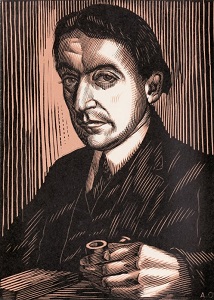
Jules Romains (26 augustus 1885 – 14 augustus 1972)
De Argentijnse schrijver Julio Cortázar werd geboren op 26 augustus 1914 in Brussel. Zie ook mijn blog van 26 augustus 2010 en eveneens alle tags voor Julio Cortázar op dit blog.
Uit: Graffiti (Vertaald door Gregory Rabassa)
“So many things begin and perhaps end as a game, I suppose that it amused you to find the sketch beside yours, you attributed it to change or whim and only the second time did you realize that it was intentional and then you looked at it slowly, you even came back later to look at it again, taking the usual precautions: the street at its most solitary moment, no patrol wagon on neighboring corners, approaching with indifference and never looking at the graffiti face-on but from the other sidewalk or diagonally, feigning interest in the shop window alongside, going away immediately.
Your own game had begun out of boredom, it wasn’t really a protest against the state of things in the city, the curfew, the menacing prohibition against putting up posters or writing on walls. It simply amused you to make sketches with colored chalk (you didn’t like the term graffiti, so art critic-like) and from time to time to come and look at them and even, with a little luck, to be a spectator to the arrival of the municipal truck and the useless insults of the workers as they erased the sketches. It didn’t matter to them that they weren’t political sketches, the prohibition covered everything, and if some child had dared draw a house or a dog it would have been erased in just the same way in the midst of curses and threats. In the city people no longer knew too well which side fear was really on; maybe that’s why you overcame yours and every so often picked the time and place just right for making a sketch.
You never ran any risk because you knew how to choose well, and in the time that passed until the cleaning trucks arrived something opening up for you like a very clean space where there was almost room for hope.
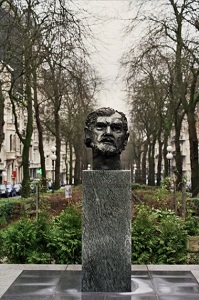
Julio Cortázar (26 augustus 1914 – 12 februari 1984)
Borstbeeld in Elsene, Brussel
Zie voor nog meer schrijvers van de 26e augustus mijn blog van 26 augustus 2012 en ook mijnblog van 26 augustus 2011 deel 1 en eveneens deel 2.
